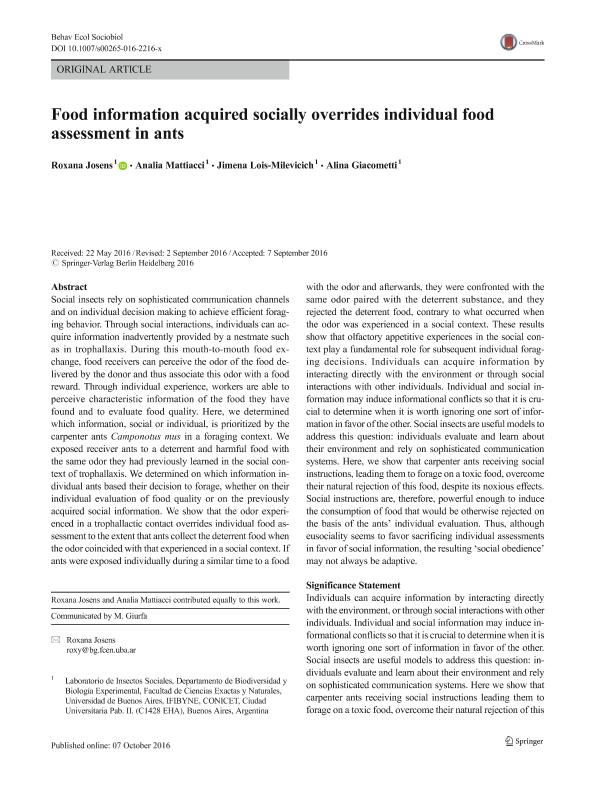Artículo
Food information acquired socially overrides individual food assessment in ants
Fecha de publicación:
12/2016
Editorial:
Springer
Revista:
Behavioral Ecology And Sociobiology
ISSN:
0340-5443
Idioma:
Inglés
Tipo de recurso:
Artículo publicado
Clasificación temática:
Resumen
Abstract: Social insects rely on sophisticated communication channels and on individual decision making to achieve efficient foraging behavior. Through social interactions, individuals can acquire information inadvertently provided by a nestmate such as in trophallaxis. During this mouth-to-mouth food exchange, food receivers can perceive the odor of the food delivered by the donor and thus associate this odor with a food reward. Through individual experience, workers are able to perceive characteristic information of the food they have found and to evaluate food quality. Here, we determined which information, social or individual, is prioritized by the carpenter ants Camponotus mus in a foraging context. We exposed receiver ants to a deterrent and harmful food with the same odor they had previously learned in the social context of trophallaxis. We determined on which information individual ants based their decision to forage, whether on their individual evaluation of food quality or on the previously acquired social information. We show that the odor experienced in a trophallactic contact overrides individual food assessment to the extent that ants collect the deterrent food when the odor coincided with that experienced in a social context. If ants were exposed individually during a similar time to a food with the odor and afterwards, they were confronted with the same odor paired with the deterrent substance, and they rejected the deterrent food, contrary to what occurred when the odor was experienced in a social context. These results show that olfactory appetitive experiences in the social context play a fundamental role for subsequent individual foraging decisions. Individuals can acquire information by interacting directly with the environment or through social interactions with other individuals. Individual and social information may induce informational conflicts so that it is crucial to determine when it is worth ignoring one sort of information in favor of the other. Social insects are useful models to address this question: individuals evaluate and learn about their environment and rely on sophisticated communication systems. Here, we show that carpenter ants receiving social instructions, leading them to forage on a toxic food, overcome their natural rejection of this food, despite its noxious effects. Social instructions are, therefore, powerful enough to induce the consumption of food that would be otherwise rejected on the basis of the ants’ individual evaluation. Thus, although eusociality seems to favor sacrificing individual assessments in favor of social information, the resulting ‘social obedience’ may not always be adaptive. Significance Statement: Individuals can acquire information by interacting directly with the environment, or through social interactions with other individuals. Individual and social information may induce informational conflicts so that it is crucial to determine when it is worth ignoring one sort of information in favor of the other. Social insects are useful models to address this question: individuals evaluate and learn about their environment and rely on sophisticated communication systems. Here we show that carpenter ants receiving social instructions leading them to forage on a toxic food, overcome their natural rejection of this food, despite its noxious effects. Social instructions are, therefore, powerful enough to induce the consumption of food that would be otherwise rejected on the basis of the ants‘ individual evaluation. Thus, although eusociality seems to favor sacrificing individual assessments in favor of social information, the resulting ‘social obedience’ may not always be adaptive.
Palabras clave:
Ants
,
Foraging
,
Individual Information
,
Olfaction
,
Recruitment
,
Social Information
Archivos asociados
Licencia
Identificadores
Colecciones
Articulos(CCT - PATAGONIA NORTE)
Articulos de CTRO.CIENTIFICO TECNOL.CONICET - PATAGONIA NORTE
Articulos de CTRO.CIENTIFICO TECNOL.CONICET - PATAGONIA NORTE
Articulos(IFIBYNE)
Articulos de INST.DE FISIOL., BIOL.MOLECULAR Y NEUROCIENCIAS
Articulos de INST.DE FISIOL., BIOL.MOLECULAR Y NEUROCIENCIAS
Citación
Josens, Roxana Beatriz; Mattiacci, Analia; Lois Milevicich, Jimena; Giacometti, Alina; Food information acquired socially overrides individual food assessment in ants; Springer; Behavioral Ecology And Sociobiology; 70; 12; 12-2016; 2127-2138
Compartir
Altmétricas




